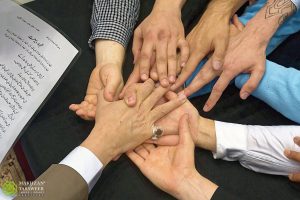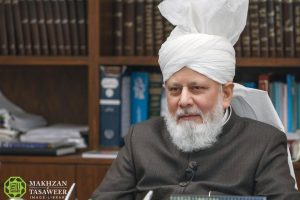
Professor Amtul Razzaq Carmichael, UK
In an epic series of lectures and sermons compiled as “Khilafat Ala Minhaje Nabuwwat” (Khilafat upon the precepts of prophethood) the Second Caliph of the Ahmadiyya Muslim Community, Hazrat Mirza Bashiruddin Mahmud Ahmad (ra) gave an account enlightening his followers about the true circumstances regarding the split of the Ahmadiyya Muslim Community into two parts in 1914. This article is based on the summary of the contents of pages 381 to 477 of Volume I. [1] The Second Caliph (ra) said: I am writing about the true circumstances that led to the split within our Community. I also wish to set the record straight for those who are contemplating joining our Community; it is imperative that they have the true knowledge of the history of the split before making their final decision.
Historical Background
Khwaja Kamaluddin supported by Maulvi Mohammad Ali established a circle of like-minded individuals who apparently had taken the Bai’at (Oath of Allegiance) to the Second Caliph (ra), but deep down remained unconvinced about the institution of Khilafat (Caliphate). In their private meetings, they regularly attacked the concept of Khilafat. The Second Caliph (ra) relates that only 15 days after the death of the Promised Messiah (as), Khwaja Kamaluddin asked me in the presence of Maulvi Mohammad Ali seeking my views about the authority of the Khalifa. I responded by saying that the time to ask this question was before we took the Oath of Allegiance. Now, the Second Caliph (ra) had clearly stated that we had to show perfect obedience to him. As we took his Oath of Allegiance after hearing that, we now had no right to discuss this point.
Anjuman or Caliph?
The Second Caliph (ra) explained that during the first Jalsa Salana after the demise of the Promised Messiah (as), the speeches of Maulvi Mohammad Ali and his colleagues reiterated again and again that Anjuman (The Executive Body) is the true heir to the Promised Messiah (as). They repeated this message so many times that people openly started to question who was the ultimate authority within the Community? Was it the Anjuman (The Executive Body) or the Khalifa?
To clarify this point, Mir Muhammad Ishaq Sahib (ra), wrote down questions regarding the importance and authority of Khilafat and sent them to the First Caliph of the Ahmadiyya Muslim Community, Hazrat Hakim Maulvi Nooruddin (ra), who assigned Maulvi Mohammad Ali to write the answers to these questions. When Maulvi Mohammad Ali presented his response, this totally astounded the First Caliph (ra). To resolve the matter, the First Caliph (ra) instructed the original questions should be sent to Jama’at (Community) in different parts of the country. The First Caliph (ra) convened a meeting in Qadian on the 31st January, 1909, to have a discussion and debate on this subject.
An Extraordinary Meeting
The 31st of January, 1909, was an extremely important day in the history of Ahmadiyyat. This was the day to make the decision whether Ahmadiyyat would follow the Community of the Holy Prophet (sa) or instead end up taking the route of worldly organisations. Those were difficult times, many misguided individuals openly stated that if the First Caliph (ra) took a decision against the Anjuman (The Executive Body), they would retaliate by making a concerted effort to dismiss the Khalifa. Most people recognised the real possibility of dissension and its disastrous consequences.
Those people who had accepted Ahmadiyyat after that day found it really hard to understand the pain and suffering endured by those attending the meeting. Most Ahmadis offer the prayer of Tahajjud (pre-dawn voluntary prayers), but this was a night when people offered extremely passionate prayers in Mubarak Mosque, seeking Allah’s support and guidance. When the First Caliph (ra) led the Fajr prayer (pre-dawn prayer), and he recited the verse of the Holy Qur’an which translates, ‘Those who persecute the believing men and the believing women and then repent not, for them is surely the punishment of Hell, and for them is the punishment of burning,’ [2] Whilst reciting this the voice of the First Caliph (ra) became overwhelmed with emotion and with extreme passion, he recited this verse again. This had a profound effect on the people; most of them understood the reality of faith. This was a divine sign that everyone witnessed.
Later, people gathered and when the First Caliph (ra) arrived for the meeting, he refused to stand at the platform prepared for him and took his place towards the north of the mosque. This part of the mosque was built by the Promised Messiah (as).
An Outstanding Address
The First Caliph (ra) delivered a magnificent speech in which he clearly stated that Khilafat is a concept of Shari’ah (Islamic law). No Divine community can make progress without the institution of Khilafat. The First Caliph (ra) said, ‘My God has promised me that for every person who will forsake me, Allah the Exalted will grant me a Community. So, I am not worried about anything. I believe in the blessings of God and believe that my God will help me.’ The First Caliph (ra) said that it is a matter of great disrespect and ignorance to say that the role of Khalifa should be reduced to leading the prayers, taking the Oath of Allegiance and leading the Nikah (Islamic marriage announcement) ceremonies.
During this speech, the First Caliph (ra) said that the actions of people who hold such views have really offended him as they have disrespected the status of Khilafat. To express his anguish, he chose not to even stand in the part of the mosque that was built by such people. The First Caliph (ra) said, ‘I elected to stand in the part of the mosque that was built by the Promised Messiah (as).’
The True Status of a Caliph
This was a magnificent speech by the First Caliph (ra); people understood the error of their ways. People realised that it was not their place to even think about dismissing the Caliph. The meeting came to a successful conclusion and it appeared that Allah the Exalted had saved the community from dissension and discord. After this meeting, the vast majority of people fully understood the true concept of Khilafat and, therefore, there was no need to discuss this topic further.
The Split and the Challenge
Khwaja Kamaluddin was a very astute person and read the situation well. From then on, he refrained from talking about Khilafat in public meetings, but his underground anti-Khilafat activities continued, which culminated in the split of the Ahmadiyya Muslim Community. After the demise of the First Caliph, Hazrat Hakim Maulvi Nooruddin (ra), and the election of the Second Caliph, Hazrat Mirza Bashiruddin Mahmud Ahmad (ra), many high-ranking people joined the dissension and left Qadian for Lahore. Dr Mirza Yaqoub Baig, pointing at the Taleemul Islam High School, said resentfully, ‘We are going now and within 10 years all these places will be in the hands of Christians.’ They all left for Lahore claiming that Ahmadiyyat would be destroyed as an organisation and there would be no one to stop its destruction.
Khilafat; a Divine Institution
After the split, Allah the Exalted showed by His powerful signs that He is the Provider and Protector of Ahmadiyyat. Ahmadiyyat is a tree planted by the hand of God and mere mortals cannot destroy it. Despite the betrayal of all these people, Allah the Exalted granted Ahmadiyyat strength and security even at the hands of Caliphs who were labelled ‘weak and worthless’ by their opponents. No one, and no one, can stop the work of Allah.
About the Author: Professor Amtul Razzaq Carmichael MD, MEd, FRCS (Gen Surg.), MBBS, is a consultant. She qualified in 1987 with gold medals for academic excellence and undertook her surgical training at major teaching hospitals in London, Edinburgh, and Philadelphia. She has authored many articles for major peer-reviewed scientific journals. She is a senior member of The Review of Religions Editorial Board as well as Assistant Manager.
ENDNOTES
[1] Hazrat Khalifatul-Masih II (ra) “Khilafat Ala Minhaje Nabuwwat”. Vol. I pages 381 to 477. Publisher Fazle Omar Press Qadian 2010
[2] The Holy Quan, Chapter 85:Verse 11




Add Comment